
Michael Laurence Nyman, CBE is an English composer, pianist, librettist, musicologist, and filmmaker. He is known for numerous film scores, and his multi-platinum soundtrack album to Jane Campion's The Piano. He has written a number of operas, including The Man Who Mistook His Wife for a Hat; Letters, Riddles and Writs; Noises, Sounds & Sweet Airs; Facing Goya; Man and Boy: Dada; Love Counts; and Sparkie: Cage and Beyond. He has written six concerti, five string quartets, and many other chamber works, many for his Michael Nyman Band. He is also a performing pianist. Nyman prefers to write opera over other forms of music.
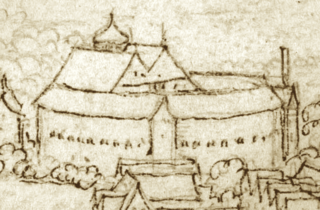
The Globe Theatre was a theatre in London associated with William Shakespeare. It was built in 1599 at Southwark, close to the south bank of the Thames, by Shakespeare's playing company, the Lord Chamberlain's Men. It was destroyed by fire on 29 June 1613. A second Globe Theatre was built on the same site by June 1614 and stayed open until the London theatre closures of 1642. As well as plays by Shakespeare, early works by Ben Jonson, Thomas Dekker and John Fletcher were first performed here.

Home Service is a British folk rock group, formed in late 1980 from a nucleus of musicians who had been playing in Ashley Hutchings' Albion Band. Their career is generally agreed to have peaked with the album Alright Jack, and has had an influence on later work. John Tams and several other members of the band, have had solo careers and worked in other projects. In 2016 John Kirkpatrick replaced Tams as main singer in Home Service, and features as such on their next album.
The Michael Nyman Band, formerly known as the Campiello Band, is a group formed as a street band for a 1976 production of Carlo Goldoni's 1756 play, Il Campiello directed by Bill Bryden at the Old Vic. The band did not wish to break up after the production ended, so its director, Michael Nyman, began composing music for the group to perform, beginning with "In Re Don Giovanni", written in 1977. Originally made up of old instruments such as rebecs, sackbuts and shawms alongside more modern instruments like the banjo and saxophone to produce as loud a sound as possible without amplification, it later switched to a fully amplified line-up of string quartet, double bass, clarinet, three saxophones, horn, trumpet, bass trombone, bass guitar, and piano. This lineup has been variously altered and augmented for some works.
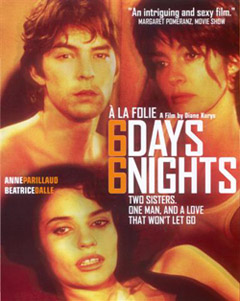
À la folie is a 1994 French drama film by Diane Kurys with music by Michael Nyman. It entered the competition at the 51st Venice International Film Festival.

The Michael Nyman Songbook is a collection of art songs by Michael Nyman based on texts by Paul Celan, Wolfgang Amadeus Mozart, William Shakespeare and Arthur Rimbaud. It was recorded as an album with Ute Lemper in 1991, and again as a concert film in 1992, under the direction of Volker Schlöndorff, again with Ute Lemper, though many of the musicians had changed. The songs have been recorded by others and as instrumentals, and are published by Chester Music. The album has been issued by both London Records and Argo Records, though the covers are the same except for the logo.

Live is a 1994 album by Michael Nyman and the Michael Nyman Band. It is Nyman's 24th release and the fifteenth with the Band. It is the first commercial live album by the band, which had previously performed live on the magazine release, 'The Masterwork' Award Winning Fish-Knife. It is also known as "The Upside-Down Violin", the only new composition on the album, and the working title, Breaking the Rules, made it into many computer sales systems. The album's cover and booklet were designed by Dave McKean. Liner notes are by David Toop. Early printings of the album cover listed the first three tracks erroneously as "Queen of the Night", "An Eye for Optical Theory", and "Chasing Sheep Is Best Left to Shepherds"

The Piano is the original soundtrack, on the Virgin Records label, of the 1993 Academy Award-winning film The Piano. The original score was composed by Michael Nyman and is his twentieth album release. Despite being called a "soundtrack", this is a partial score re-recording, as Nyman himself also performs the piano on the album. The music is performed by the Munich Philharmonic Orchestra conducted by Nyman with Michael Nyman Band members John Harle, David Roach and Andrew Findon performing the prominent saxophone work.

The Essential Michael Nyman Band is a studio album featuring a collection of music by Michael Nyman written for the films of Peter Greenaway and newly performed by the Michael Nyman Band. It is the seventeenth album release by Nyman. The album features liner notes by Annette Morreau, who describes the album as "a summation and digest of ten years of progress in the performance of music by a composer -- a composer with whom, so evidently, a group of friends and expert musicians intimately identify their total commitment, virtuosity, and joyous enthusiasm."

Michael Nyman for Yohji Yamamoto is volume 2 of Yohji Yamamoto's series of albums, The Show. The album features the solo violin work Yamamoto Perpetuo, which Nyman has since adapted into the String Quartet No. 4 and the orchestral work, Strong on Oaks, Strong on the Causes of Oaks. The violin is played by Alexander Balanescu, and Nyman can be heard on one track, "Song L," at the piano.
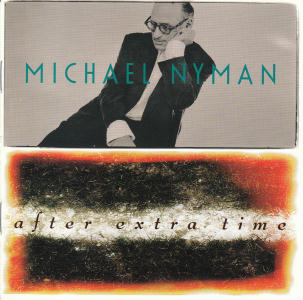
After Extra Time is a 1996 album by Michael Nyman with the Michael Nyman Band containing three tributes to Nyman's fandom of Association football: After Extra Time, the soundtrack to The Final Score, and Memorial. The latter is described as a remix, but is simply the 1992 recording from The Essential Michael Nyman Band. It was included in order to put it together with his two other football-inspired works. The album lists only three tracks, which has caused it to be erroneously reported that Memorial is track 3 and the others are all hidden tracks, but Memorial is track 26. Therefore, a track listing, as the individual portions of the pieces are not named, is not useful. The three pieces were recorded at separate times and thus have separate personnel lists.
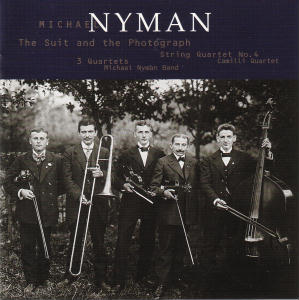
The Suit and the Photograph is a 1998 album by Michael Nyman with the Michael Nyman Band, recorded in 1995. On this album, Nyman is the composer, conductor, and producer, and wrote the liner notes. The album contains two works, String Quartet No. 4 and 3 Quartets. The album is named for its cover photograph by August Sander, which Nyman had associated with the Michael Nyman Band since its inception in 1977. He cites a description of the photograph by John Berger, in an essay of the same title, describing that the suits deform the working class rural men just enough to "undermine physical dignity." Both of the pieces on the album originated in Japan. It is Nyman's second release on EMI and his 33rd in general, but is not designated part of a series, as EMI had done with Concertos. Said Nyman of EMI, "I didn't excite them, and they didn't excite me." Nyman's only further releases on EMI would be the UK edition of Ravenous, featuring remixes by William Orbit, and The Actors, both film scores.
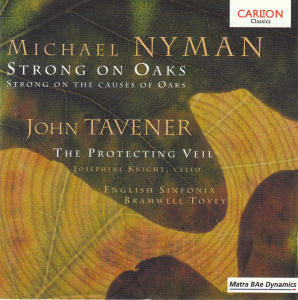
Strong on Oaks, Strong on the Causes of Oaks is a 1998 album by the English Sinfonia conducted by Bramwell Tovey. The work, by Michael Nyman, is paired with The Protecting Veil by John Tavener featuring Josephine Knight on the cello. The photography and liner notes indicate that Nyman was directly involved in the album, the premiere recording of the work, while Tavener, whose piece, was eleven years old at the time of the recording, has been recorded more than once, is represented by a headshot and stock commentary from Richard Steinetz.

And Do They Do/Zoo Caprices is the eighth album released by Michael Nyman and the fifth featuring the Michael Nyman Band. And Do They Do is a modern dance work commission by Siobhan Davies and The London Contemporary Dance Theatre, which premiered at Sadler's Wells Theatre on 25 November 1986. Zoo Caprices is a multi-stop violin solo for Alexander Balanescu based on the score for Peter Greenaway's film, A Zed & Two Noughts.

The Piano Concerto/MGV is the 23rd album by Michael Nyman, released in 1994. It contains two compositions, The Piano Concerto and MGV. The first is performed by Kathryn Stott and the Royal Liverpool Philharmonic Orchestra conducted by Michael Nyman, and the second is performed by the Michael Nyman Band and Orchestra with Michael Nyman at the piano.

8 Lust Songs: I Sonetti Lussuriosi is a setting by Michael Nyman of 8 pieces of a collection of erotic poetry from Pietro Aretino's I Sonetti Lussuriosi. The songs depict a man and woman's sexual desires for one another in varying contexts. Marie Angel premiered the piece, voicing both the male and female characters, including a voyeuristic old woman, with the Orchestra di Santa Cecilia, conducted by the composer, on 4 October 2007 at the Arsenale in Venice, Italy, on a commission from Venice Biennale. A studio recording with the Michael Nyman Band was released on compact disc 29 July 2008. It is Nyman's 59th album, and the twelfth on his own label.

The Composer's Cut Series Vol. II: Nyman/Greenaway Revisited is the second in a series of albums, all released on the same day, by Michael Nyman to feature concert versions of film scores, in this case, films of Peter Greenaway, and his 52nd release overall. The album is similar to The Essential Michael Nyman Band, although a number of tracks are on only one album or the other. In spite of being recorded in 1992, with the same lineup, Memorial is not the same performance as the one that appears on The Essential Michael Nyman Band or After Extra Time, which was recorded in Tokyo. This performance was recorded in London and is slightly less aggressively performed.

Wonderland is the 38th album release by British composer Michael Nyman and the soundtrack to the 1999 film Wonderland. It is the first of many collaborations of Nyman with director Michael Winterbottom. For Winterbottom, Nyman would later perform excerpts of this score in 9 Songs, provide a score for The Claim, and arrangements and re-used tracks for A Cock and Bull Story. Nyman's daughter, Molly, has continued the family working relationship with Winterbottom, scoring The Road to Guantanamo with Harry Escott.
Jennifer Caron Hall is an English actress, singer-songwriter, artist and journalist.

Andy Scott is a British tenor saxophonist, "equally at home in jazz and classical contexts", and award-winning composer who has made "important and sometimes mould-breaking contributions to the repertoire". He is currently Composer in Residence for Foden's Band. He has played with the Halle Orchestra, has formed and played with several ensembles whose musical style is rooted in big band jazz, Latin and funk.

















